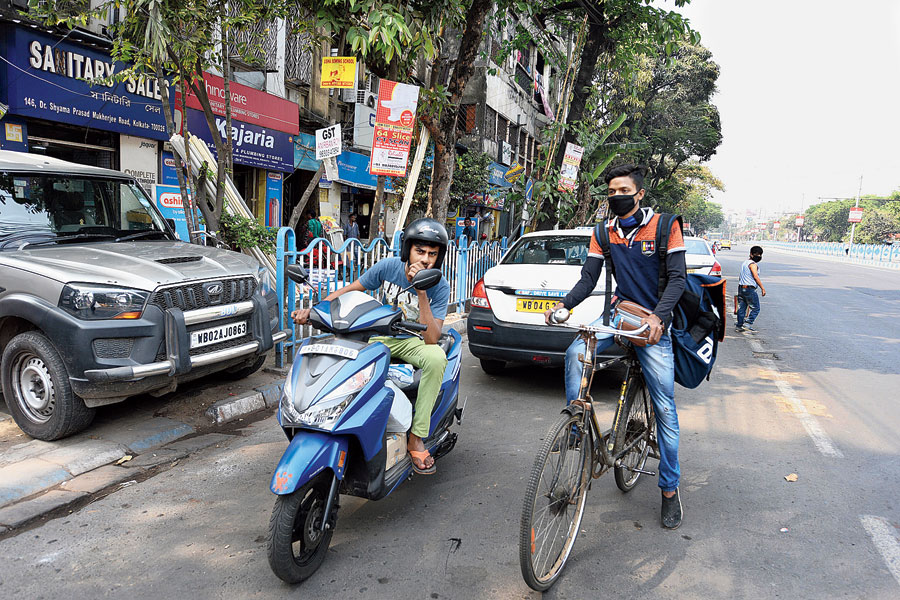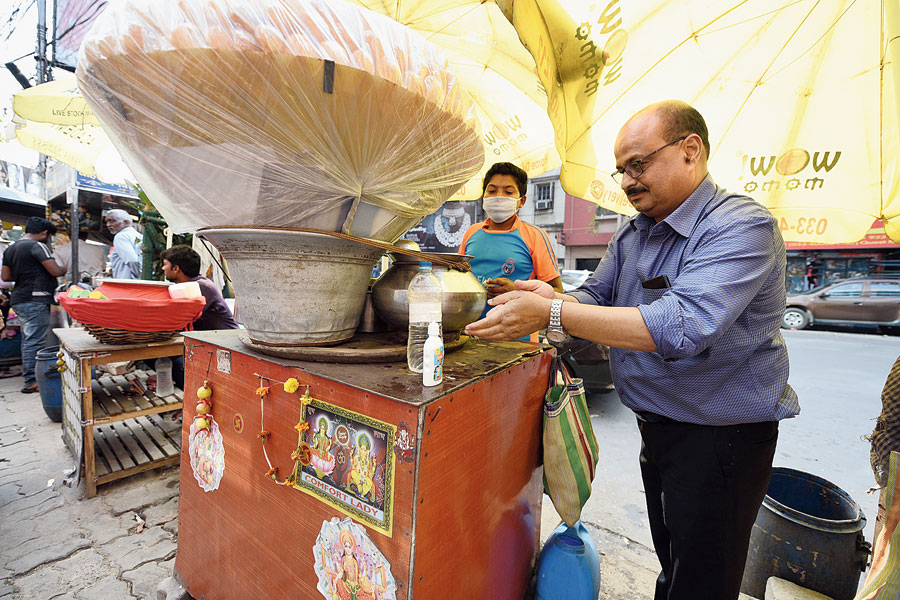
Two delivery men of an e-tailer near Tollygunge police station on Thursday. Between them the two had only seven deliveries on Thursday, they said.
Uncertainty
A man who delivers products for a fashion e-tailer requested a Tollygunge resident not to stop ordering online. The man had come to deliver flip-flops to the resident, a homemaker who had bought them for a trip to Mandarmani this weekend.
The woman took the flip-flops but rued that the trip was cancelled. It was then that the man requested her not to stop ordering online. “That was my first delivery of the day. For the past few days, the number has come down from 25 to barely five. I earn a commission of around Rs 15 for every delivery,” the man told Metro.
The man is one of a handful of delivery executives who operate in Tollygunge and neighbouring areas. He is 25, married and lives in Thakurpukur. His wife works in a shop that sells cellphones and accessories. The couple don’t have children. “We can scrape through because my wife is earning. But I don’t know what will happen if this situation persists,” said the man, who requested anonymity.
Want to work but
Rabi Sarkar is a labour supplier in Behala who mainly handles repairs and renovations of houses. He has a pool of 17 men who were working at five houses this time last month. Now, more than 10 are sitting idle. When there was work, the “skilled workers” got Rs 700 a day and the “unskilled workers” Rs 450 per day.
Now, the idle ones are getting Rs 150 a day. The fear over the spread of Covid-19 has led people to defer renovation, fearing “infection from outsiders”. Sarkar’s men come from the Sunderbans.
“In the city, they live in rooms whose rent is Rs 2,000-2,500 a month. I can only give them a daily allowance that I can afford. If this situation persists, they will have to return to their villages,” said Sarkar. A similar thing happened after the demonetisation, Sarkar said.
No takers
New Market, too, wore a more or less deserted look on Thursday afternoon. Most hawkers were sitting idle. One of them, Parvez Alam, sold bags for women. “I am yet to sell the first bag of the day,” Alam said around 3.15pm.
Earlier this month, he was selling “over 15” bags per day. Last week, the number came down to “5-6”. The slide continues this week. “I had two men working here. Now, there is one,” he said, pointing to a man who was fidgeting with his phone. The man, Mohammad Sarfaraz, gets Rs 300 daily for working at the stall. His family lives in Jharkhand.
“Aagey ka socha nahi nahi (I have not thought of the future),” he said.
The man selling coconut water at the intersection of CR Avenue and Prafulla Sarkar Street was getting restless on Thursday afternoon.
Only a handful of green coconut shells lay strewn in a basket-cum-dustbin under his makeshift kiosk. It was around 2pm and the Celsius had crossed 30 degrees.
Till last week, the basket would be full by this time. The shells would spill on the pavement and turn into a pile.
The trader, Kedar Mistri, said he would sell around 150 green coconuts every day. But for the past week, the number has plunged to 50. “Sadak soona hai. Sab ghar mein baithe hai. Aisa chalega to bhukmari aa jayega (The streets are deserted. People are at home. I am staring at starvation),” he said.
For many, social distancing forced by Covid-19 means working from home, closed schools and cinemas and stocking of essential items.
For some, the cororavirus poses a threat to their livelihood. These people depend on daily wages or commission on sales and a day without work means a day without earning. These were the people who suffered a blow following the demonetisation in November 2016.
Some of them might have to go back to their villages for lack of work in the city. Some, like Mistry, don’t know where next month’s expenses will come from if the curbs remain for a while.
He buys green coconuts at Rs 22 a piece from the Mechua wholesale market and sells them at Rs 30 a piece. Living with his cousin who works at a shop in Chandni Chowk spares him the rent and he is able to send Rs 8,000 to his wife in Jharkhand every month. “I wont be able to send Rs 5,000 this month,” he said.
The Telegraph lends an ear to similar worries from the city.
Uneasy calm
Shantanu Maity was frying a paratha for a lone customer at his stall, right outside the SP Mukherjee Road gate of Kalighat Metro station, around 2.30pm on Thursday.
The footpath on which his and a host of other stalls stand is normally crowded throughout the day. On Thursday, it was deserted. “The calm is uneasy because the place is always bustling and noisy. Many of the regular visitors are students. But since the schools are shut, they have vanished,” said Maity.
On other days, he needs around 13-14kg of maida. But for the past five days, he has needed one-third of it. On Friday, the solitary customer eating at Maity’s stall was the owner of the shop beside his.
Maity sells “plain paratha and aloo-paratha” at Rs 10 and Rs 20 a piece, respectively. A kilo of maida makes 20-22 parathas, he said. “The expenses are rising. I don’t have enough savings for tuition fees of my children beyond two months,” Maity said.

